Is SEO Still Worth It?
With the speed at which technology changes, it's only natural to wonder if online marketing strategies like SEO are still worth it.
And then comes the age old question… What on earth is SEO…?
Let alone does it still work in 2025?
Well...
Billions of people are still going to Google every day to find products, services & information they are looking for.
Internet Live Stats reported that as of 2025 Google gets 8.5 billion searches a day.

On top of that, SEO has come a long way.
In the early days of search engines, simply adding a list of keywords to a website was all that was needed.
It was cheap…
No backlinks.
No technical stuff.
No content clusters.
No nothing.
Literally spam the page with keywords and you rank.
Mind you… that was the wild wild west back in 2010.
Back then search engines just looked for keywords, then added those websites to a list of ones searchers might be interested in looking at when they needed information.
Today, though, that isn't nearly enough.
In fact, it's considered bad practice just to list a string of keywords at the bottom of the website.
Search engines demand a lot more from websites if the site is going to rank highly.
But are people still going to Google to find products & services?
Are they trusting Google, Yahoo & Bing to get them to the right site?
And, if a website is at the top of the results or nowhere to be found, does it really make a difference?
YES.
And SEO is definitely still worth it.

Search engines continue to evolve, helping searchers find exactly what they need, even if they're not sure what keyword to use.
Since a list of keywords is no longer helpful, optimising the website to help it rank higher is necessary.
Once that's done, further optimisation is needed to keep up with the trends and ensure searchers can still find the site.
But we’re getting way ahead of ourselves…
Let’s start with seeing how you as a business owner should check if SEO will be worth it for you this year.
Typical Concerns Business Owners Have About The Value Of SEO
As with any type of marketing, business owners may be concerned about whether it's worth the time, cost, and effort.
You’re probably wondering if you even need SEO…
Once that hurdle has been overcome here’s a list of things that stop most business owners from fully benefiting from SEO.
Here’s 7 of the most common concerns Business Owners Have About SEO
1) No Help is Needed
Business owners may believe they don't really need any help.
After all, SEO seems simple on the outside – insert keywords in various places on the site and get results.
The truth is, it's far more complex than that, so help is needed to get the best results.
Expert assistance can make sure the proper techniques are used, that everything is updated, the website runs properly, and a lot more to gain an even higher ranking and keep it.
2) It's Too Expensive
Costs for everything are rising, so it's easy to say that adding SEO to the marketing plan is too cost-prohibitive.
We get it… we even wrote a guide called “Paying For SEO Sucks”
However, when the ROI is considered, the cost is much lower than what would be needed to get the same return with a different technique.
3) It's Not Instantaneous
Search engines use web crawlers to visit websites and use algorithms to determine the right ranking for various keywords.
This takes time, and even once it's done, it will take time before the website starts seeing an increase in visitors and conversions.
Though it does take time, it will provide results over the long term, too.
Businesses will continue to see an increase in visitors, not just a jump that appears quickly and then disappears again.
4) The Business is Too Small
Small business owners often think all they need is a website, and they'll start getting visitors.
While some people may find the site or visit it because of another form of advertising, this isn't going to lead to the big increase in visitors they're hoping for, and they may not have many people view the site.
No matter how large or small a business is, SEO can make a difference and bring in more potential leads.
If you are a small business just getting started with SEO you may check out our recommended SEO Strategies For Small Businesses.
5) Hacks and Tricks Aren't Making a Difference
Often, business owners start trying to optimise their websites on their own to save money.
They'll look at other websites, find hacks and tricks to help optimise their site, and then wonder why they aren't getting results.
Many will give up and swear off SEO, thinking that it doesn't work.
SEO isn't just hacks and tricks that can be implemented randomly to gain a higher ranking.
It's a series of techniques that work together over the long term to get results.
6) The Website Was Just Designed or Redesigned
Often, optimisation includes redesigning a website, as this can help with the flow of the website and how it appears to visitors, which can help it get a higher ranking.
However, even though the website may have been recently redesigned, if this wasn't done with SEO in mind, it's not going to help.
The redesign can still be used, though, and other SEO techniques can be used to further update the website and make sure it's fully optimised.
7) I’m already doing Google Ads
Google ads are great… however having worked with a tonne of business owners both getting their ads profitable and on their SEO, on a side-by-side comparison, SEO almost always beats Ads out in ROI in the long term.
We've broken the rest of this guide down into 8 sections which will help you determine if SEO will still be worth it for your Business.
SEO vs Traditional Marketing
Traditional marketing techniques have been used for decades.
I myself, cut my teeth on offline direct response marketing back in 2007.
Helping small business owners get more customer with newspaper ads, flyers and making their Yellow Pages ad work.
Pity is… the Yellow Pages isn’t what it used to be (check out our Yellow Pages v’s SEO guide here).
And to really put the nail in the coffin you can see the yellow pages decline here:

And while other offline channels still work… online is where it’s at.
What makes it worse is people, in general, have gotten better at ignoring traditional marketing tactics, as they've been exposed to them since they were old enough to read.
Billboards, television commercials, ads on the radio, and more are all traditional marketing techniques, but they're all also easy to ignore.
Though they can be beneficial in some areas and may still work to draw in new customers, they don't compare to the benefits and reach of getting your website found on Google.
SEO is not only newer but more in line with how people get more information and shop for the items they need in this day and age.
When someone wants to go out to dinner, they're unlikely to remember that billboard they saw a couple of weeks ago.
They're inundated with information every day, so it's easy to simply forget billboards and other ads they've seen, even if they made a point to remember something.
When they search for restaurants near them, though, they'll find plenty of options to choose from. They may even recognise the name of one from a billboard, which they may not have done without it being shown in the search results.
Search Engine Optimisation is the basis for how those results are curated and organised.
The continuous growth in Google just demonstrates that we still haven't reached the cap to the growth of online search.
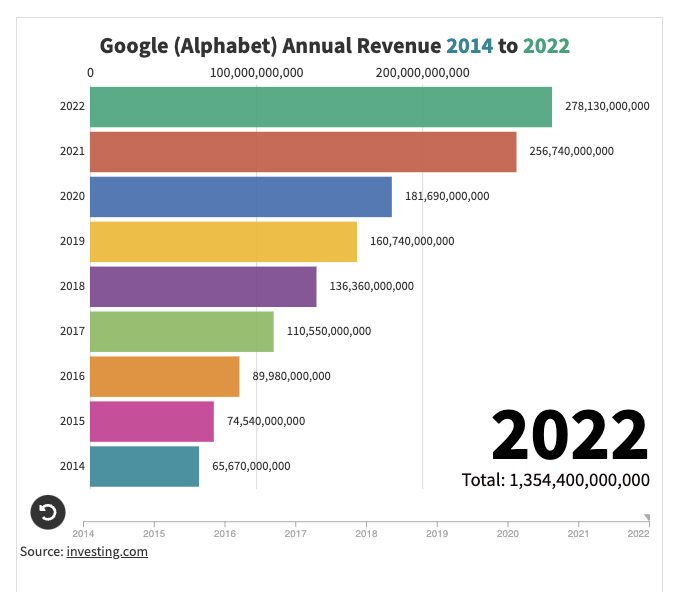
Optimising a website helps it show up in the results and gets it as close to the top as possible, which makes it easier to draw in potential customers.
They're not just looking at another ad.
They're looking at information directly related to what they need at the time.
How to Measure The Value Of SEO
It's easy to spot claims that the ROI on SEO can be 500% or more.
You’re probably calling BS right now?
Right…
After all, that's a huge jump in the potential for any business, and it seems almost too good to be true.
Fact is though… we’ve gotten these kind of results for our clients many times.
Check out two case studies here:
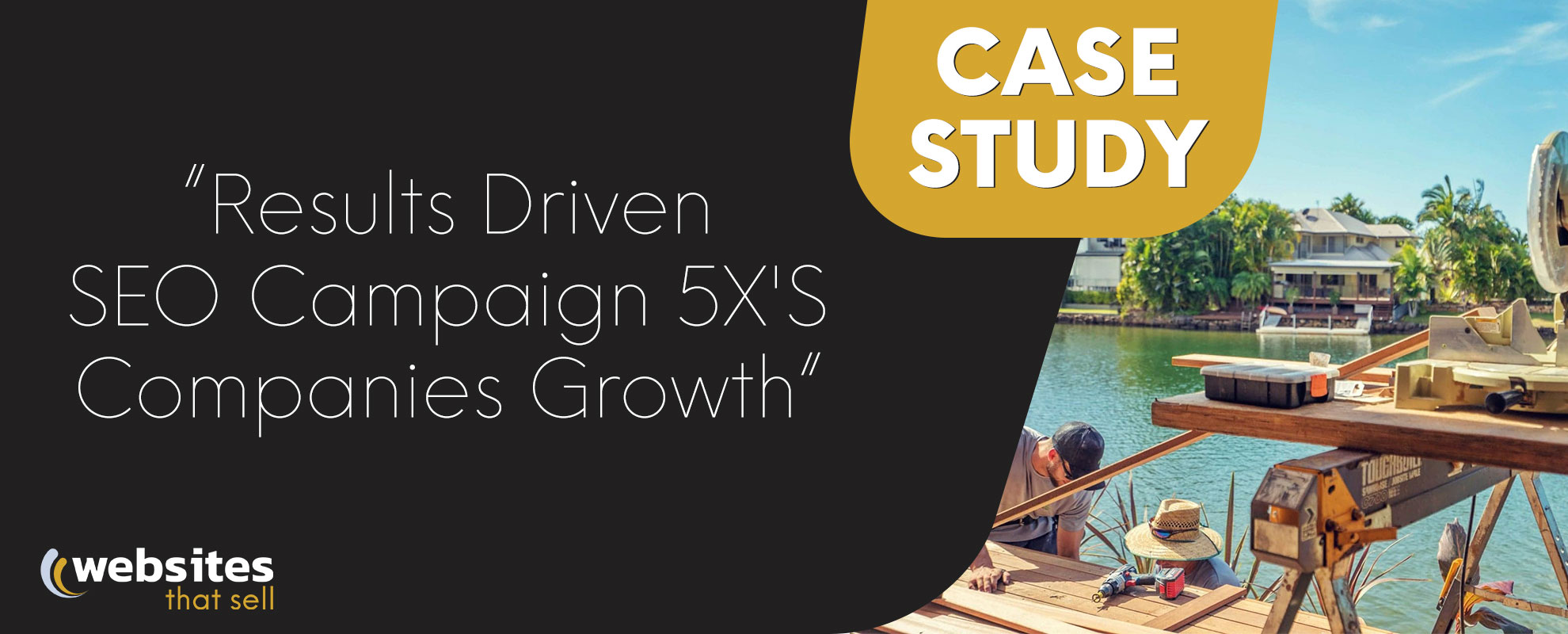
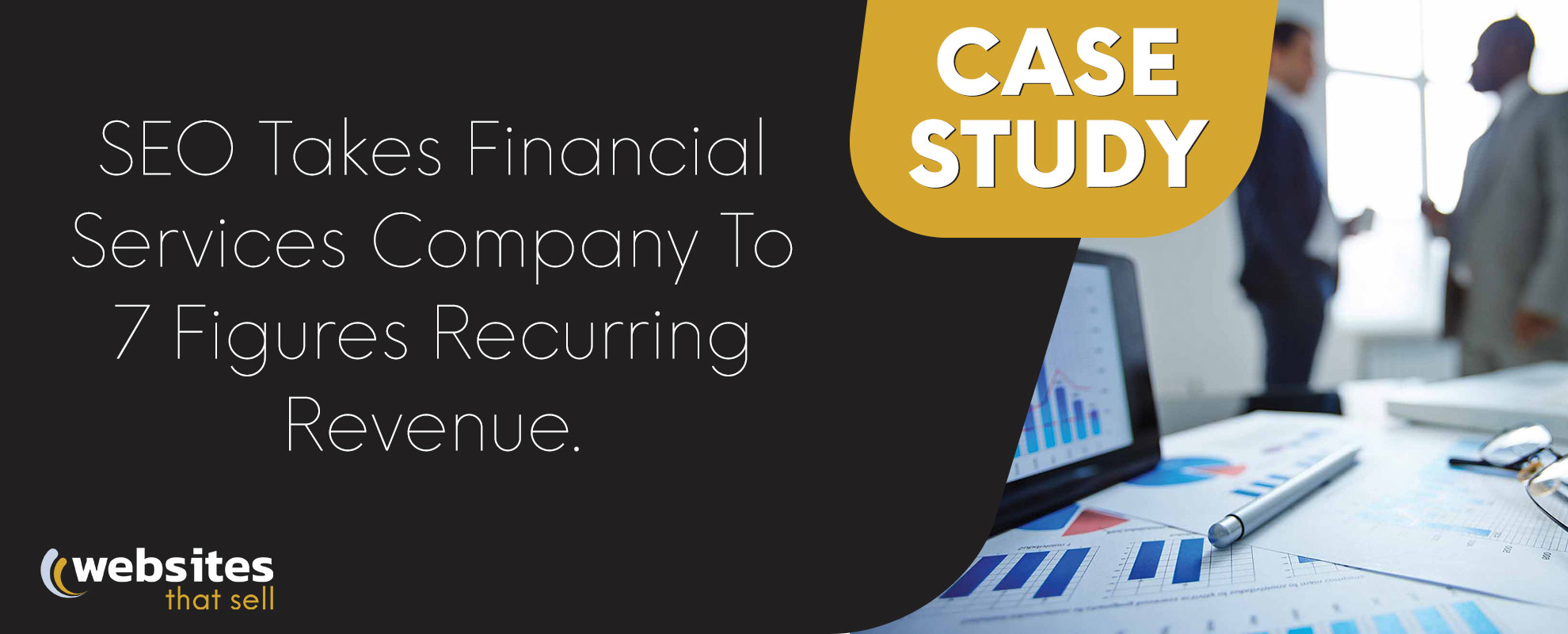
Also, you can check out more client testimonials here and you can also read all of our SEO case studies here.
When determining if SEO is right for a business or trying to see if it's helping and how much it's helping, it's important to take the time to calculate the ROI.
Calculating the ROI for SEO only uses a couple of numbers and can be easily compared to other types of advertising, provided the same formula is used for all of the calculations.
Measuring the ROI of SEO requires knowing the gain from the investment and the cost of the investment.
Google Analytics data can be used to determine the gain from the investment.
Here's The Formula To Use:
Subtract the cost of investment from this number, then divide it by the cost of investment. Multiply the resulting number by 100 to determine the per cent.
For example, a business starts to use SEO to increase its ranking and the number of organic searches that bring in new visitors to its site. They can use the information from Google Analytics to check the gain from their investment and find out it's $56,000 over one period. They spend $8,000 on SEO during that same period.
Using the formula above, $56,000 minus $8,000 is $48,000. Divided by 5,000, that is 6. Multiply this by 100 to find an ROI of 600%.
That's how the big numbers are seen, and though the numbers in the example are made up, it's easy for anyone to plug in their company's information to see the same results.
It may seem too good to be true, but the math backs up the claims for just how high the ROI can be for search engine optimisation.
There are two things you can do from here.
1) We offer a service that reports and works out your ROI every month - it’s our SEO Reporting Service.
2) You can maximise your ROI by following our guide, which shows you how to squeeze every last drop of ROI from your SEO.
What Are The Greatest Opportunities In SEO?
With so many businesses using SEO to boost their rankings, it's easy to see how hard it might be to rank for basic keywords related to the company.
However, there are still plenty of opportunities within SEO that can help the business grow.
Some of the opportunities that any business can take advantage of will include the following.
Local SEO Results

Instead of going after the big keywords, which may be far more difficult to rank for, businesses can look into local SEO results.
Adding the city and state can help narrow down the results for searchers and allow them to find something nearby instead of thousands of miles away.
Companies that sell products or services can rank easier for local searches, allowing them to be seen by those who are more likely to purchase from them.
GEO-Based Rankings (eg. Brisbane, Sydney, Melbourne, Adelaide, Perth and also regional areas like Sunshine Coast & Gold Coast)

Adding geographical markers when optimising the site can help target searchers better.
Like with local SEO, the results searchers see are connected to their specific location, so they're more likely to see results that include businesses in their area.
It's also possible to search for other locations, like when someone is planning a trip, to make sure they can find anything they might need in a specific location.
We employ this strategy ourselves.
While our companies headquarters are on the Sunshine Coast, we also have a page for our satellite SEO office in Brisbane and our SEO Gold Coast page here.
Niche Keywords
The big keywords are harder to rank for because there are so many companies competing for the same ones.
Niche keywords don't have as much competition, which makes it much easier to rank for them.
Business owners can take advantage of this by using niche keywords when they optimise their site, helping find searchers who may be looking for something within that specific topic.
We have an entire service that focuses on while it’s Done For You Keyword Research, it’s more like a website growth map.
Business Listings
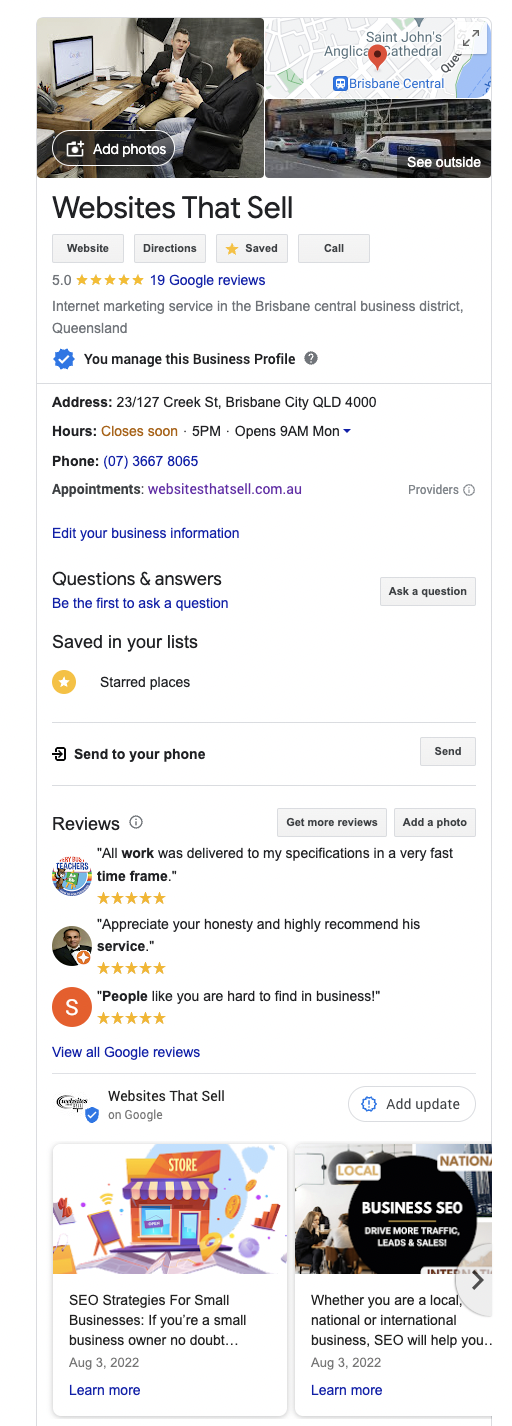
When searchers are looking for products or services, especially if they need to find something local, Google and other search engines display business listings.
Searchers can see information about local businesses that may have what they need.
Optimising these listings and keeping them updated can be an excellent opportunity for bringing in more visitors.
We provide a citation building as part of our link building services.
Is SEO Still Relevant In 2025?
Yes.
People still search online for what they need, and search engines do still use algorithms to rank websites, striving to provide the best results for any specific search.
Check out our full list of SEO statistics over the years here.
As long as people still search for what they need and search engines still use algorithms, SEO will always be relevant.
SEO is changing rapidly, though.
It's not enough to just get everything set up.
The way people are searching has changed, and so have the algorithms that search engines use.
Since the pandemic, more people have been shopping online or using the internet to get information about local stores, products and services available near them, and more.
Ways to search are changing, too.
Instead of just typing in a keyword or phrase in the search engine, searchers are using voice searches from smartphones to find what they need.
Voice searches tend to use keywords that sound more natural, so they are different from the keywords and phrases used in the past.
When people type in what they're searching for, they tend to use longer phrases or questions, too.
Algorithms are being updated regularly to add new ways to rank websites.
In the beginning, websites were only ranked when they matched the keyword someone was looking for, so often, the content was stuffed with keywords.
Because of the algorithm changes, this no longer works and, in fact, can lead to penalties for the website.
The algorithms now look at everything, from the overall content on the website to the way it's set up and whether it automatically adjusts based on the screen size the searcher is using.
As these two components change, SEO not only remains relevant but becomes more important.
Business owners must stay on top of the trends to keep up with the changes, stay at a higher ranking, and avoid potential penalties.
Continuing to optimise the website is the only way to have a sustainable ROI and to keep bringing in new visitors and potential leads.
Is Paying for SEO Worth It?
Every cost for a business is carefully considered to avoid wasting funds and potential income.
And it’s important to get an understanding of how SEO pricing works, so you can make an educated decision..
That’s because even when the cost has a high ROI associated with it, best practices dictate determining if the ROI is really worth the cost to the company.
While there are tons of tricks and hacks to help business owners optimise their websites, there are benefits of paying for assistance with SEO, including the following.
Expert Advice On What to Do
Paying for SEO provides businesses with expert advice that can't be obtained elsewhere.
Of course, it's easy to find and read articles on optimisation, but how accurate are they?
How relevant are they?
Even the best articles may not be relevant for a particular business because they offer general advice on techniques, not advice for a specific niche in a certain location.
Expert advice can delve further than online articles can and provide more relevant information to help the business.
Expert advice is usually given by someone that’s qualified like a SEO consultant.
Now that you know that expert advice is worth it… next challenge is “How To Choose A Great SEO Consultant”
Save Money On Optimisation
Paying for optimisation can lead to saving money.
Business owners who attempt to optimise the site on their own will try different techniques that may not work and could end up costing them in lost sales potential.
By paying for expert advice, business owners can get the right advice to avoid techniques that won't help and skip over outdated advice that could be harmful.
Avoid Getting Behind The Trends
Experts are highly trained, so they can spot trends and start working on adjustments to the website before they may be obvious online.
They continuously learn more about what is happening with the search engine algorithms, what the search trends are, and what can be done to further optimise the site.
Their advice can help keep the website ahead of the trends, avoiding lost income potential from getting behind.
Are SEO Companies Worth It?
Paying for SEO assistance is beneficial, but what are the benefits of working with an SEO company?
There are many benefits business owners can see, but some of the biggest ones include the following.
Save Time
Optimisation takes time.
There's a lot to do at the beginning to get it all set up, and regular work is needed to keep everything updated. By letting a company handle this, the business owner can save quite a bit of time and make sure everything is done properly.
More Efficient
Experts know how to get everything done quickly and efficiently. This can help with saving time and money, and it can help to ensure everything gets done promptly when any changes are needed.
Help with Understanding Analytics
Analytics are available for just about every part of SEO, but putting them together and seeing the big picture and the impact on the business may not be as easy. When business owners work with an SEO company, they can get brief reports that are easier to understand and answers to any questions they may have about the analytics.
Increase in Sales and Revenue
SEO takes time to do. Doing it right from the start, though, can lead to a faster increase in sales and revenue. Keeping up with the trends and making sure the website is always updated to keep a higher ranking will mean the increases in sales and revenue will continue.
We’ve created a great guide that will help you find the best SEO company for you.
What is the State of Google?
Check out this 6 minute documentary created by Discovery UK.
The Invention And History of Google | Silicon Valley: The Untold Story
In 1996, Google was first created by two university students attempting to create an algorithm to make search results more relevant for anyone doing a search online.
By 1999, they had eight employees, and funding was obtained to help launch Google.
By 2005, the company had started using advanced technology to create Google Maps and purchased a failing phone software company, which would soon become Android.
Email soon followed, as well as smartphones, better mapping and GPS, and a lot more.
Though the company may have started small, in less than 30 years, it has now become the largest search engine and is worth billions of dollars.
Google isn't stopping here, though.
The company is expanding beyond Silicon Valley, hiring as many as 7,000 new employees, and looking forward to the technology of tomorrow.
The same premise still applies from the day it was created, though.
The company started with a focus on algorithms and improving search results, and it continues to do the same today.
Along with updating technology and growing in new directions, Google still focuses on upgrading the algorithms used for search results.
Over time, the algorithm has been updated to adjust for voice searches, to make local searches more relevant, and to improve the quality of websites shown in the results.
This is all expected to continue far into the future, as the company aims to help users find exactly what they're looking for when they do a search.
Will SEO Exist In 10 Years?
The internet is changing.
Search engines are changing and updating.
But they're not disappearing.
Check the data...
If the data is anything to go by we are on a steep growth trend:
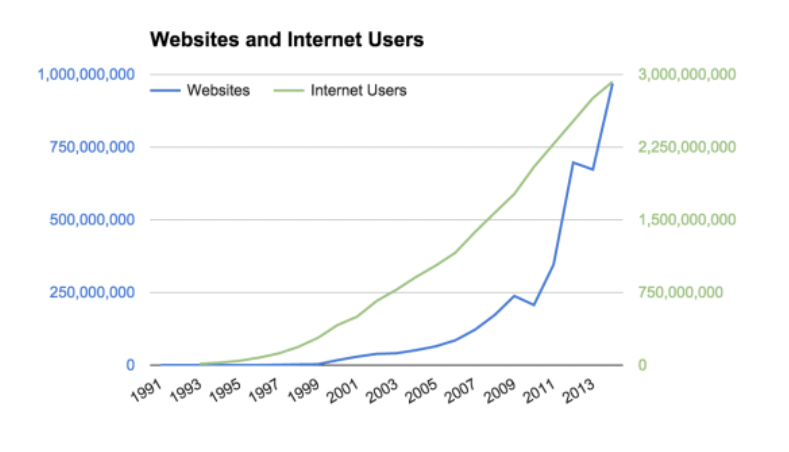
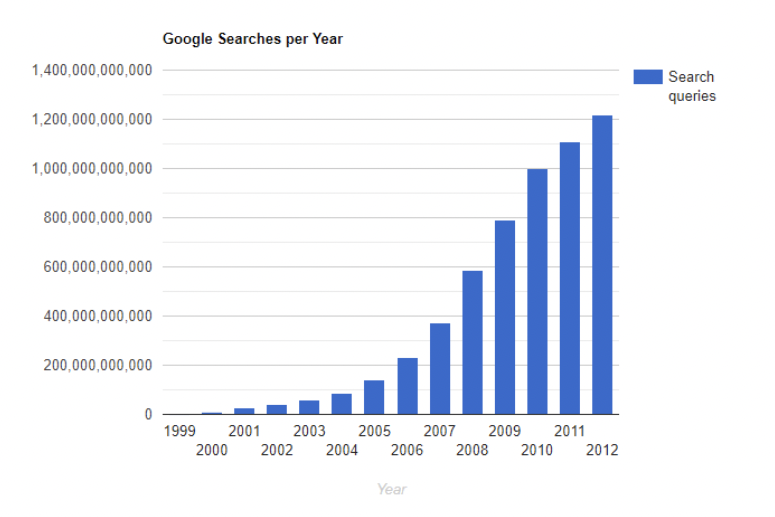
Having said that... the internet is changing.
Search engines are changing and updating.
But they're not disappearing.
Even though voice searches are continuing to increase, people are still searching through search engines to find the information they need.
Technology will continue to update and change, algorithms will need to be adjusted, and the view of websites in search results may change in the upcoming years.
None of it, though, will just disappear.
As long as searches are still done, no matter what form they're in, search engines will still exist, and so will SEO.
In fact, SEO may become more important over the next 10 years as more companies are vying for the highest position in search results.
Properly optimising the website and keeping up with the changes will help businesses continue to rank highly, so they will still need SEO services to keep their website in view.
SEO isn't going anywhere, and it isn't getting less important as time goes on.
It's becoming more crucial.
With more competition, more people searching for what they need online, and better technology being created, SEO is becoming far more important and is still well worth it.
Even if new ways to advertise are created, optimisation will still be a critical component in a marketer's arsenal, allowing them to adjust websites, gain higher rankings, and bring in more visitors/leads/sales.
